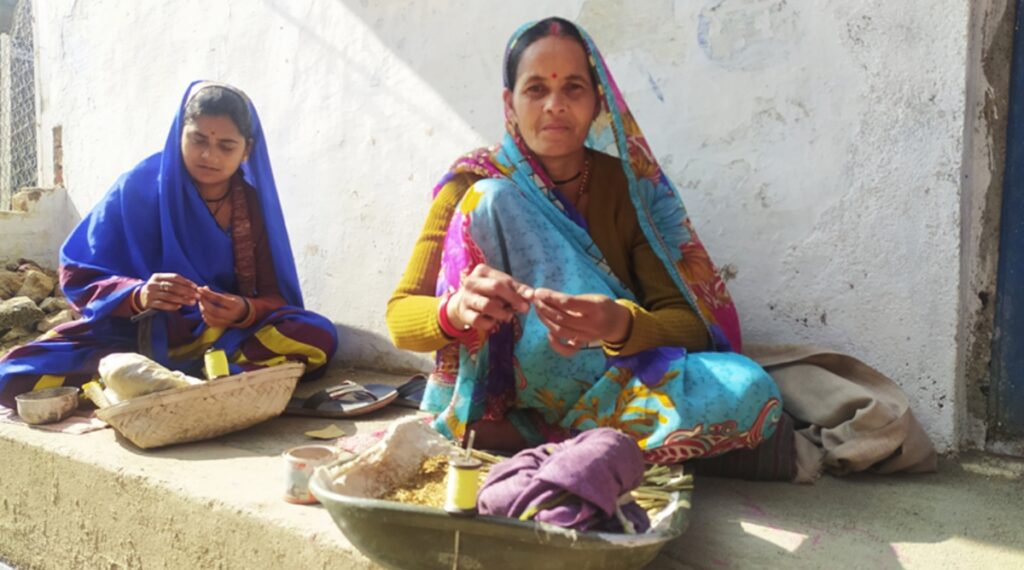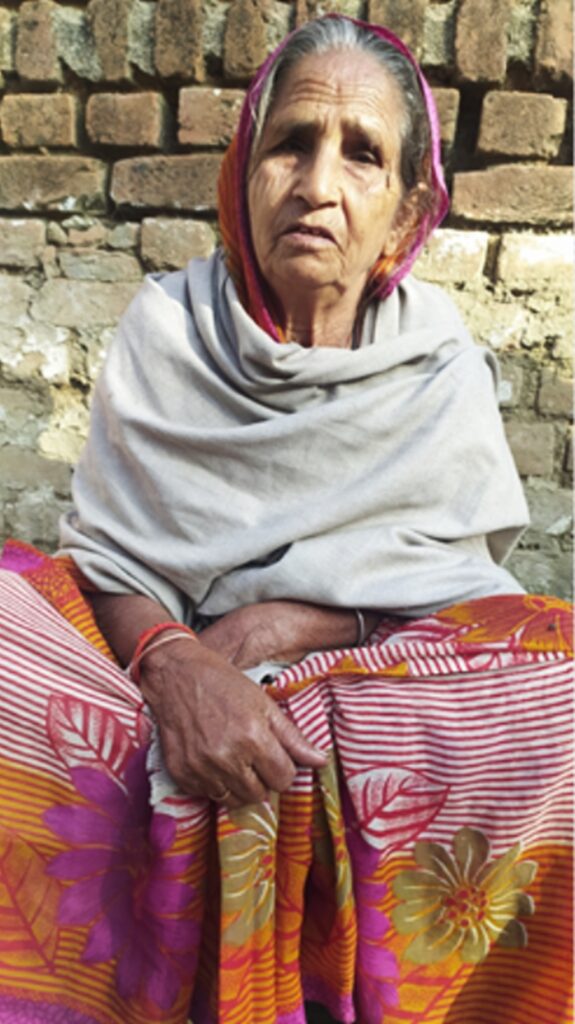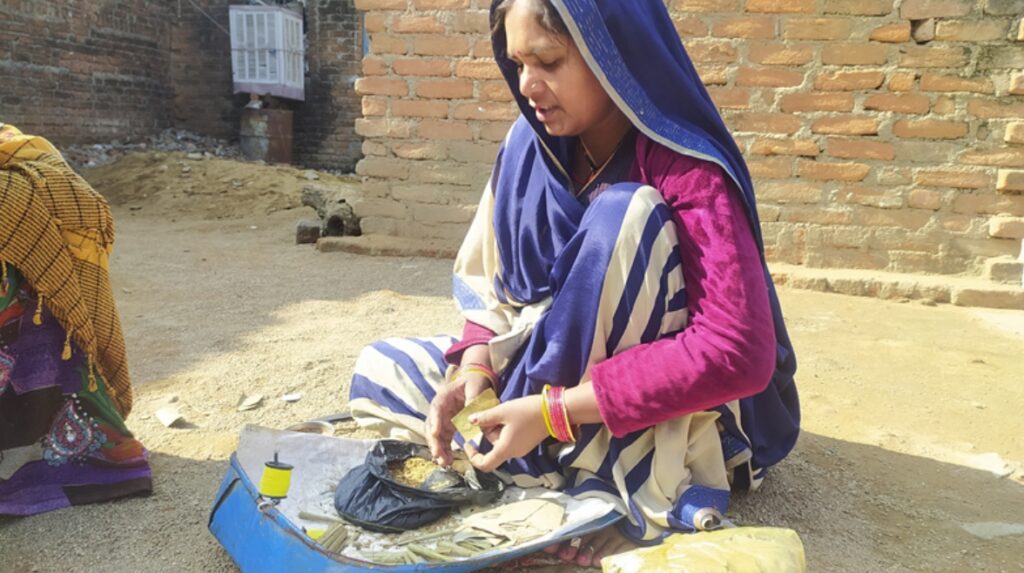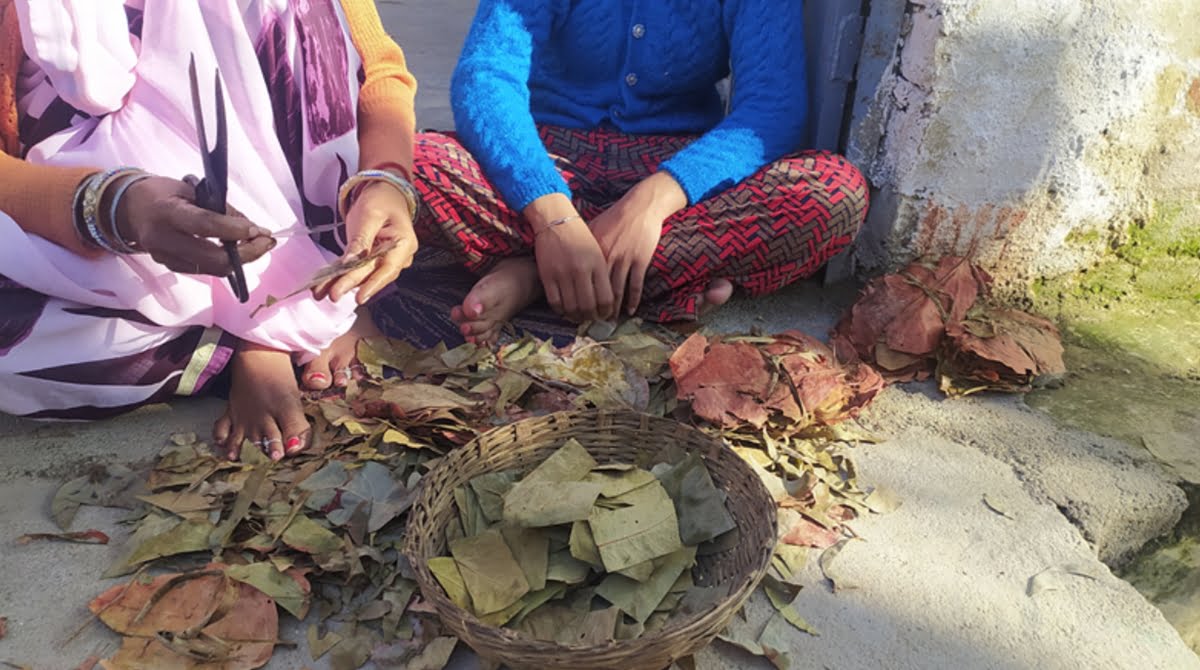“If I sit from afternoon till evening to make beedi then I can make enough so that I can earn at least Rs. 50,” says Gayatri Yadav, a Beedi worker from a small town Ranipur, Uttar Pradesh. Yadav has been rolling beedis (tobacco rolled in tendu leaves) since she was a kid, the art of rolling the tendu leaves is something that she learnt from her mother.
Most of the women in Ranipur have been making beedis for many years to help out their husbands. For the past 10 years, the traditional terrycot business of the town has been on a decline and this has increased the burden on women beedi workers to earn more money.
“Beedi to banani hi banani hai, 100 rupaiyan ke lie beediyan mai din kat rae, do-teen bachan paal rae,” (We have no option but to roll beedis. For mere rupees 100, we have to continue to roll beedis, to take care of our two-three children.) adds Yadav.

Also read: A Day In The Life Of The Women Beedi Rollers In West Bengal’s Birbhum District
Most of the women beedi workers in Ranipur work as contract labourers. The tobacco companies provide them with the raw materials and the job of these women involves rolling the beedis. For the past 10 years, these women have been earning Rs100 for rolling 1000 beedis. In a day, most of them, because of managing household chores and taking care of kids, can roll a minimum of 100 to a maximum of 500 beedis. This accounts for a daily income of Rs10-Rs50. The condition of women beedi workers in Ranipur is reflected all over India. According to the International Labour Organisation, in India, the beedi rolling industry employs more than 5 million workers and most of them are women. The poor wage conditions are similar for all women who work as contract labourers for beedi rolling. Data from WHO also suggests that only 11 per cent of workers are registered and work in the organised sector while the vast majority remain unidentified by the government and work in the unorganised sector.
According to the International Labour Organisation, in India, the beedi rolling industry employs more than 5 million workers and most of them are women. The poor wage conditions are similar for all women who work as contract labourers for beedi rolling. Data from WHO also suggests that only 11 per cent of workers are registered and work in the organised sector while the vast majority remain unidentified by the government and work in the unorganised sector.
Poor wages and exploitation
“They don’t give me ration, they say my fingerprints are not readable. My sons ask me to fend for myself on my own as I don’t have a ration card. At this old age with persistent joint pain and lung issues, I am only able to make 100 beedis per day. With whatever little money I get, I eat something. I cannot do any other jobs too, my helplessness makes this job a compulsion.” says 63-year-old Sushma Devi, another beedi worker from Ranipur whose fingerprints have faded as a result of making beedis by handling tobacco dust and rolling them into tendu leaves.

There are women like Sushma Devi in Ranipur who survive only on the money that they earn by making beedis. Many communities in India survive on this money. Poor wages are something that runs in a similar sense all across the country.
A recent report, “Knowledge Gap in Existing Research on India’s Women Beedi Rollers & Alternative Livelihood Options: A Systematic Review for Promoting Evidence-Informed Policy and Prioritising Future Research”, by AF Development Care,(AFDC) a New Delhi-based research consulting group mentioned that over 71 per cent of beedi workers in the country are women. Despite this, there is a lot of exploitation and a massive gender gap in wages in the industry.
A study by Behan Box mentions the gender gap because of which women in the beedi industry are underpaid. In the organised sector women not only earn less than half (Rs 126 per day) of what men get paid (Rs 266 per day) but their wage is also less than the national minimum wage of Rs 178 per day set by the Code on Wages, 2019.
This disparity was explained by Dithhi Bhattacharya, director of the Centre for Workers’ Management (CWM) in a report by the Pulitzer Center. Bhattacharya mentioned that the beedi-making industry is the only industry where the workers are paid by considering only the piece rate. The lapse of not including time and labour in the Beedi Cigar Act, 1966 is utilised by companies who set a price rate for labourers per 1000 beedis rolled. This standardised rate was also achieved by putting up only skilled men in a room. These men were able to roll 1000 beedis in 8 hours, hence this became the standard way of paying.
“It’s impossible to make 1000 beedi in a day, the work is exhausting and it’s not the only work that we do. Apart from that if we keep on making beedi continuously for a long time our joints will pain and the hands will burn because of tobacco,” says Bhagunti Yadav, another beedi worker from Ranipur.
Another issue is no social security benefits. As per the AFDC report, out of all the women, beedi workers in India who work in the unorganised sector 94 per cent of women do not qualify for social security benefits. These women are deprived of work rights, leave rights and minimum wage rate. According to the workers in Ranipur the companies often take more than 1000 beedis from them and still pay the same amount which is INR 100.
“I have not received my pension for the past three years, every time I go to the government office they cook up some story. None of us knows what else work to do hence despite the low payment we continue doing this work,” says Devi.
Deteriorating health
“My hands have cuts due to the thread used to cut leaves and bind the beedi, doctor says that my lungs are damaged by inhalation of tobacco and my knees and joints are in constant pain by sitting for hours every day to make beedi. I have no money to get a proper treatment done and I cannot leave making beedi too,” says Kranti Yadav, another resident of Ranipur who has been making beedis for the past 20 years.

According to another survey which was a part of the AFDC report, 92.5 per cent of women who roll beedis suffer from bronchitis, and 99.5 per cent of them have joint pains. Apart from that diseases like cancer are also prevalent in the beedi making community as a result of inhaling tobacco. Data from the survey also suggests that more than 29 per cent of money earned by these women in a year goes into managing medical expenses.
According to another survey which was a part of the AFDC report, 92.5 per cent of women who roll beedis suffer from bronchitis, and 99.5 per cent of them have joint pains. Apart from that diseases like cancer are also prevalent in the beedi making community as a result of inhaling tobacco. Data from the survey also suggests that more than 29 per cent of money earned by these women in a year goes into managing medical expenses.
Apart from this, another major issue is diminishing fingerprints which in turn is also a loss of identity. Although they do want to shift to another profession, due to the lack of schemes and rural employment crises, many do not have the privilege of considering these health risks when choosing their livelihood.
Government policy and benefits
India indeed does have laws to protect the rights of beedi workers. To regulate the working conditions of beedi makers and provide welfare policies, in 1966 the Beedi and Cigar Workers (Conditions of Employment) Act was implemented. After this, in 1976, the Beedi Workers Welfare Fund act was established. These two acts were enacted to take care of the employment rights of beedi workers, and provide welfare schemes to them and their families relating to health, education, insurance etc.
Despite these laws, the conditions of beedi makers have only deteriorated over the years. As the benefits of these schemes haven’t reached the majority of women, beedi makers still operate in the unorganised sector amidst poor working conditions and low wages.
However, this remains the first time the central government associated with the local beedi makers association across states so that the policies can reach more women and also proper changes in the policy can be made. Apart from this, it is pertinent that a minimum wage be set up for beedi makers and that they are provided basic employment rights.
Also read: Why Aren’t We Talking About Rural Women’s Mental Health?
Adding to that, proper skill training on a larger level should be given to these women so that they can look for other more sustainable employment opportunities. The beedi workers should be made aware of basic government policies which can aid them to get loans, funds and training so that they can switch over to better occupations and healthier working conditions.
All photos have been taken with the consent of the women workers who were photographed.




